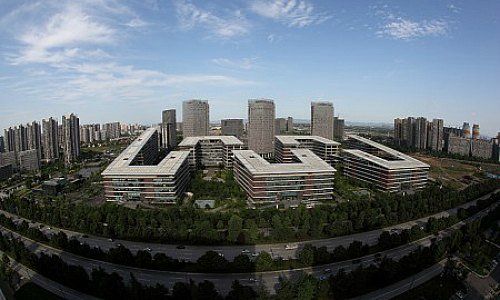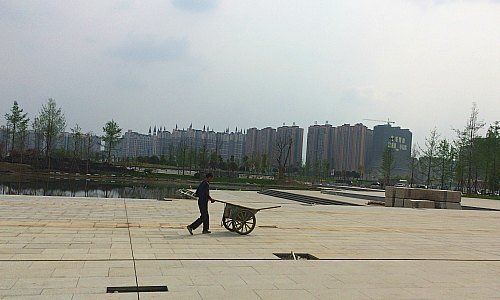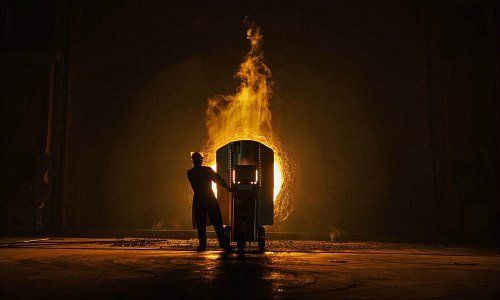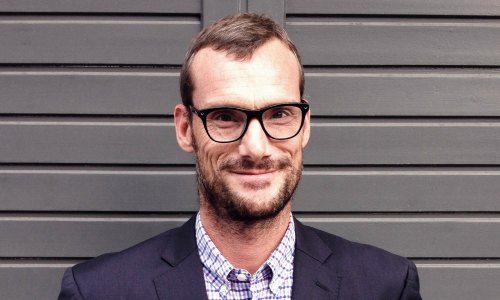China's development is the biggest socioeconomic experiment in world history. The outcome is open. finews.ch took the opportunity to gain an insider's view.
finews.first is a forum for renowned authors specialized on economic and financial topics. The texts are published in both German and English. The contributions appear in cooperation with Pictet, the Geneva-based private bank. The publishers of finews.ch are responsible for the selection.
Arriving in Chengdu, a megalopolis with more than 15 million inhabitants in China's Western province of Sechuan, the cultural shock expected is notable by its absence. The airport, one of the world's thirty largest, is simply modern and displays none of the exotic traits of the Far East. The motorway to the city center is flawless and free of congestion, very much like the broad boulevards of the city center, where electric scooters whiz about. Roads are adorned by anonymous office and apartment blocks or shopping and trading malls.
Chengdu is very much the mirror of modern China, a country that managed to catch up with the West, with a consumer-oriented middle class and powerful and competitive industries. An economy that is about to overtake the U.S.' as the world's largest.
«The author thus took a journey into the unknown.»
Chengdu has an important role to play in the bigger plan: the city, which is growing rapidly, is destined to act as a transmission belt, as a center of high tech and education for the western provinces of China, which are lagging the East in economic development.

Stars Foundation, an independent organization based in Stein am Rhein in the Swiss canton of Schaffhausen, chose Chengdu as venue for this year's conference attended by finews.ch.
The participants, mainly young Swiss, European and Chinese managers, visited development centers, innovation parks, established businesses and startups, listened to speeches and discussions by prominent guests such as Joerg Wuttke, the president of the European Union Chamber of Commerce in China, Huang Jing of the Lee Kuan Yew School of Public Policy, Uli Sigg, arts collector and former Swiss ambassador to China or journalist and writer Urs Schoettli, a specialist on Asia.
The author of this text had never before been to China and thus took a journey into the unknown. And the big unknown was very much what the conference was all about.
«Will China manage to continue on its path?»
The speeches, discussions and talks focused on the one questions, decisive as it is for the future of the giant country and the world at large: will China, a country of 1.4 billion, manage to continue on its path of development and consolidate or will the experiment led by the inner circle of the Communist Party (CP) founder in face of the manyfold and immense challenges?

The conference brought several hundred years of work and business experience in China around one table. And all of the participants seemed to have in mind the same words of Mark Twain as their guiding principle: «It ain't what you don't know that gets you into trouble. It's what you know for sure that just ain't so.»
One participant, a regional manager of a German specialty chemicals maker, during the presentation of a city representative said, referring to the notorious difficulties to get reliable information in China: «When the Chinese start talking about their five-year-plan, I switch off.» It is simply impossible to distinguish between propaganda and deception from fact and figure.
«Strewn with intrigue and feuding»
Another speaker, who's worked in China ever since the 1980s and enjoys very good contacts to Beijing, said that the information void also applied to the party bosses and government circles. He compared the machinations within the inner circle of power with the famous TV series «The Borgias», which describes the path to glory and power of the Borgia family, strewn with intrigue and feuding all the way to the seat of the Pope and beyond.
Visits at Chinese companies and startups left the participants with impressions of a different quality altogether. The visitor met young, sometimes second-generation entrepreneurs who'd develop their ideas according to a high technological standard and with great enthusiasm.
Xu Hao for example built an application for editing pictures at his Camera360 firm. He had attracted 600 million users over seven years, a clientele that now uploads two billion pictures a day. Or the Ming family, which built a specialist for energy-saving LEDs with Sunfor, a company with a global presence. Or a young startup who created a mobile food service in Chengdu and reached breakeven with three months.
«A Chinese doesn't need a business card since he has 'WeChat'».
He swiftly waved away my question about a business card, arguing that a Chinese didn't need a business card as he had all his contacts assembled on «WeChat», an app which allows him to communicate with them and even do simple business transactions.
Exchanges like this, incidental as they may seem, confirmed the impression that China has moved on from being an economy oriented towards cheap exports to a highly competitive and technologically advanced power.
However: the persistent smog emanating from the region's heavy industry chokes the city, seemingly empty and gray office blocks, rumors about a banking system about to collapse due to the many bad loans, little transparent and unproductive state enterprises, corruption, zombie industries kept alive artificially, unconfirmed reports about local unrest – symptoms, problems and challenges to suggest that China is living dangerously.

Li Keqiang, China's prime minister, in March presented a report on the work of the government at the grand gathering of the National People Congress (NPC) and the Chinese People's Political Consultative Conference (CPPCC). It was an illustration of the diverse economic, social and ecological dangers and the extreme challenge which a centralized government of such a heterogenous economy and society poses.
«The government knows that the level of economic growth isn't sustainable.»
In the report, he makes mention of a series of measures, ranging from monetary and fiscal policy, to a cut in administration, a restructuring of the state-run zombie companies, the fostering of entrepreneurship and the private sector in general, the development of high-tech and services companies, investment in infrastructure and transport, urban development, a modernization of agriculture, the fight against pollution and the support of sustainable technologies and, last but not least, reforms to the government.
What the listing of all these measures implies is that the party elite and the government know that the level of economic growth isn't sustainable and that both economic, structural and also political reforms are necessary. At the same time, all is being undertaken to prevent a hard landing of the economy.
The 13th five-year-plan presented in November of 2015 revealed in which direction economy and society are to develop: while growth targets and a further modernization of the economy is part of the plan, much is made of targets such as the fight against poverty, a development of equal social benefits for all, the education opportunities, the modernization of cities, infrastructure and public facilities, the fight against the pollution of the environment and water.
Such announcements serve propaganda purposes of course, but the party bosses around Prime Minister Li Keqiang and President Xi Jinpin are serious enough. The Chinese government fears nothing more than social unrest and an economic stagnation of the hard-working middle classes.
«What counts is the 100-year-anniversary of the power of the party.»
The big danger of tensions arising within society and possible unrest becomes evident if one takes into account the urgent cuts in the excess capacities in the iron ore and coal mining industries, cuts that will make millions unemployed.
Xi Jinpin has made it clear: it is not the 100th birthday of the Communist Party of China, founded in 1921, which counts, but the 100-year-anniversary of the power of the party, which it would reach in 2049 and would count as a world record.
The president has managed to cement his authority in the four years in his post and enjoys as much power as maybe no-one before him. He and his disciples are strict adherents of an authoritarian state capitalism – and not in favor of more democracy and pluralism.
Urs Schoettli says that the quite probably biggest socio-economic experiment in world history has tallied up so far. Xi Jinpin and his party's concern about sharing power is not only due to the justified worry about losing control. It is also down to the fear about a collapse as demonstrated by the implosion of the Soviet Union and the CPSU in 1989.
The short- and medium-term impact of such a disintegration in China on the world economy would be hard to estimate, and in no way controllable. The sometimes panic-stricken reactions by the markets on news about an economic slowdown in China are a but a taste of things to come. China's persistent development and its successful completion of the planned goal of a moderately wealthy society has made the rest of the world dependent. The experiment should better not go wrong.
Peter Hody is deputy editor-in-chief of finews.ch. He has held several managerial positions at «Cash» and «Stocks», Swiss financial news outlets. Earlier, he was a reporter at Associated Press and RTL/ProSieben. Hody studied history and acquired an MBA in Media Management at the Hamburg Media School.
Previous contributions: Rudi Bogni, Adriano B. Lucatelli, Peter Kurer, Oliver Berger, Rolf Banz, Dieter Ruloff, Samuel Gerber, Werner Vogt, Walter Wittmann, Albert Steck, Alfred Mettler, Peter Hody, Robert Holzach, Thorsten Polleit, Craig Murray, David Zollinger, Arthur Bolliger, Beat Kappeler, Chris Rowe, Stefan Gerlach, Marc Lussy, Samuel Gerber, Nuno Fernandes, Thomas Fedier, Claude Baumann, Beat Wittmann, Richard Egger, Maurice Pedergnana, Didier Saint-George, Dieter Ruloff and Marco Bargel.


































